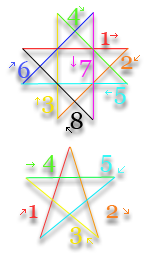Auseklis
Auseklis (derived from root aus- - "dawn"[1]) was a Latvian god, and the personification of the celestial body of Venus - the first "star" (how Latvians call it) to appear in the mornings on the east side of the sky. He is the third most popular deity in Latvian mythology after Saulė and Mēness, but is almost exclusively mentioned in folk songs.
Auseklis as a god

Auseklis is closely associated with Mēness ("moon"). They both are Dieva dēli ("sons of God"), and are thus confused with each other and with other male deities. Auseklis is the groom of Saules meita ("daughter of the sun"). Auseklis is often referred to as being very young.
Auseklis as a symbol
Auseklis is also the name of eight-pointed star (a regular octagram). It is also known as one of the crosses of Lietuvēns (a malevolent spirit). The other cross of Lietuvēns is the pentagram, which symbolizes Venus in other cultures, suggesting that both signs might have originally been symbols of Auseklis. In more modern times, the pentagram is sometimes seen as a symbol of evil, however originally both signs were used for protection from evil and are named after Lietuvēns, because they were used to ward it off. Both signs had to be drawn without lifting the hand to ensure that protection was effective.
In the 1980s, the octagram became the symbol of the third Latvian National Awakening.
Further reading
- Latvijas Enciklopēdija, Rīga 2002, ISBN 9984-9482-0-X
- Dainuskapis.lv
See also
References
- ^ Krauklis, Konstantīns (1992). Latviešu etimoloģijas vārdnīca (in Latvian). Vol. I. Rīga: Avots. ISBN 5401004117.
